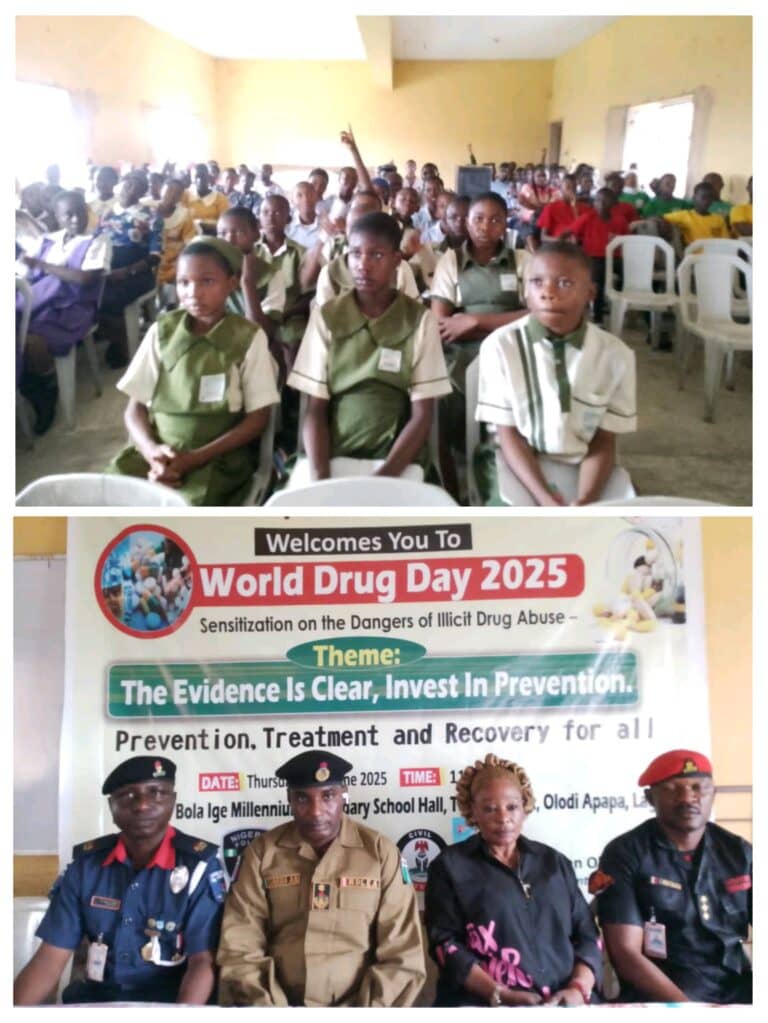By; RAYMOND TEDUNJAYE, Lagos Members of the Crime Reporters Association of Nigeria (CRAN) joined the rest of the world in commemorating the
By; RAYMOND TEDUNJAYE, Lagos
Members of the Crime Reporters Association of Nigeria (CRAN) joined the rest of the world in commemorating the 2025 International Day Against Drug Abuse and Illicit Trafficking with a warning to youth on the negative implication of drug abuse to their future.
At a sensitization lecture held at the Bola Ige Millennium Secondary School Hall, Tolu Complex to mark the event, the media group urged the students shun drug abuse, saying it is capable of ruining their future.
The programme, themed, “The Evidence is Clear: Invest in Prevention,” was hosted at the Bola Ige Millennium Secondary School Hall, Tolu Complex, and focused on urgent education about the dangers of drugs like marijuana, cocaine, and methamphetamine.
In his opening remarks, President of CRAN Mr. Olalekan Olabulo to the students drawn from about ten schools, said that drug abuse is no longer a distant problem but a growing threat within their communities.
“Drug abuse is not peculiar to Nigeria, but because of what is happening here, the accessibility, the pressure, the ignorance, we have to take it personally and fight from within,” Olabulo said.
He challenged the students not only to apply the knowledge from the programme in their personal lives but also to act as ambassadors of change among their peers.
“When you leave here today, don’t keep this knowledge to yourself. Share it with your friends. That conversation might save a life, it might save your own future.”
Olabulo said CRAN has consistently carried out school-based advocacy for over four years and is committed to reaching young people before drugs do.
Adding weight to the message, Deputy Commander of Narcotics (DCN) Garba Abubakar from the National Drug Law Enforcement Agency (NDLEA) delivered a chilling breakdown of the consequences of substance abuse.
He warned the students about substances such as cocaine, heroin, marijuana, and methamphetamine, explaining that drug use damages internal organs, weakens the body, and often leads to homelessness and chronic health issues.
“It’s very deadly, very dangerous, and very difficult to withdraw when you start,” he said.
“Even some legal drugs, like cough syrups and Paracetamol, can become harmful when abused.”
The NDLEA official reminded students that drug offences in Nigeria carry penalties of up to 20 years in prison, reinforcing that addiction has legal as well as health consequences.
Ambassador Olatutu Oladunni, Chairperson of the Lagos State chapter of the Sports Writers Association of Nigeria (SWAN), also addressed the students with a different angle, the hidden risks of nutrition and sports doping.
She warned that careless consumption of edibles or supplements could sabotage athletic careers.
“What you eat can either make or mar your future,” she said. “Edibles may contain banned substances that, if detected in a drug test, could disqualify a young athlete from competition and destroy years of effort.”
She advised students to embrace proper hygiene, balanced diets, and regular physical fitness as a way to stay mentally sharp and physically strong , without reliance on performance-enhancing or recreational drugs.
The CRAN-led initiative highlights growing concern over the reach of drug abuse into low-income, high-risk areas like Ajegunle, where many students are exposed to drugs through peers, pop culture, or even family.
While Nigeria’s drug problem has often focused on urban centers and adult users, this event reinforced the reality that secondary school students are now directly in the line of fire.
According to the NDLEA, over 14 million Nigerians are engaged in drug use, many of them adolescents. Experts have repeatedly called for comprehensive school-based prevention programmes, community rehabilitation centers, and stronger border and prescription drug controls.
With the 2025 World Drug Abuse Day theme emphasizing “investment in prevention,” the CRAN event was a clear signal that the war on drugs must begin at the grassroots, in classrooms, assemblies, and conversations among youth.
As Mr. Olabulo concluded, “You, the students, are the future. And if we lose you to drugs, we lose the country.”
The challenge now is whether government institutions, parents, and society at large will match this level of urgency and take action before Nigeria’s drug crisis consumes its next generation.
#NewNigerianNewspapers www.newnigeriannewspapets.ng




COMMENTS